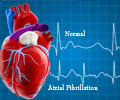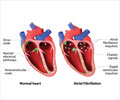People with atrial fibrillation, the most common heart rhythm disorder should kick the habit of smoking to cut their stroke risk, reports a new study.

While many strokes are prevented with oral anticoagulant drugs, there are limited data on the impact of smoking cessation after atrial fibrillation diagnosis.
This study examined the association between smoking cessation after newly diagnosed atrial fibrillation and the risks of stroke and all-cause death. The researchers used the Korean National Health Insurance Service database and the National Health Screening database. Koreans aged 40 and older are advised to have a national health check-up every two years. Take-up rates are high: for example, 75% were screened in 2014.
The researchers identified 523,174 patients with newly diagnosed atrial fibrillation from 2010 to 2016. Patients with prior strokes were excluded. The study included the 97,637 patients who had a national health check-up less than two years before being diagnosed with atrial fibrillation, and a second check-up within two years afterward. Patients were followed-up after the second check-up until the end of 2017 for the occurrence of stroke or death.
The average age was 61 years, and 62% were men. Participants were classified according to the smoking status before and after atrial fibrillation diagnosis: never-smoker, ex-smoker (stopped smoking before diagnosis), a quitter (stopped smoking after diagnosis), current smoker (includes those who persistently smoked before and after diagnosis; and new smokers who started after the diagnosis). The proportions of never smokers, ex-smokers, quitters, and current smokers were 51.2%, 27.3%, 6.9%, and 14.6%, respectively.
During a median three-year follow-up, there were 3,109 strokes and 4,882 all-cause deaths (10.0 per 1,000 person-years and 15.4 per 1,000 person-years, respectively).
Advertisement
Quitters remained at higher risk compared with never-smokers. The risks of stroke and all-cause death were raised by 19% and 46%, respectively, but these associations were consistently observed only in men. New and persistent smokers had even greater risks of stroke compared to those who had never smoked. For new smokers, the probability was raised by 84%, and for persistent smokers, it was elevated by 66%.
Advertisement
She noted that the benefits of quitting were less pronounced in those who had been heavy smokers before their atrial fibrillation diagnosis. Heavy smokers were defined as those who had smoked 20 cigarettes every day for at least 30 years. "This may be related to longer-term damage to the blood vessels which increases susceptibility to having a stroke," said Dr. Lee.
Dr. Lee said: "If you don't smoke, don't start. If you do, it's never too late to quit. Regardless of how much you smoke, kicking the habit is good for health."
Source-Eurekalert















